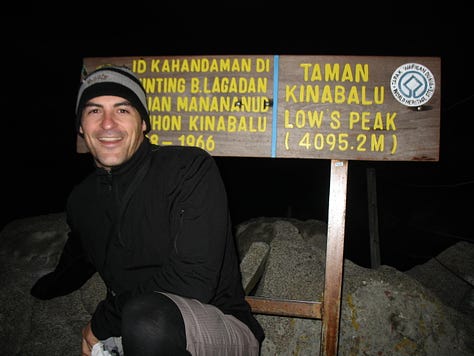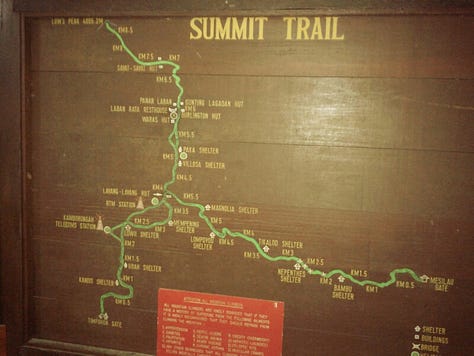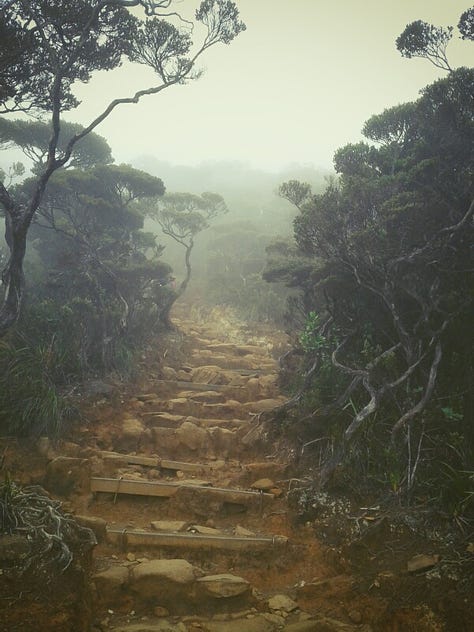It was an experience so significant and personal, I’m of the mind I will never forget it. One of those moments when life and literature, the internal world of the self and external reality bang together, blend.
However, as Aslan said to the Daughter of Eve in Lewis’ exquisite novel, when we come down from the mountain, things aren’t so quick and clear. We forget the signs.



The unforgettable experience took place on a mountain. Kinabalu, Malaysia’s highest peak. Standing at 13,435 feet above sea level, the World Heritage site is in a botanical area with more than 5,000 plant species and is the highest mountain between the Himalayas and New Guinea.
I flew with a friend to Sabah for the adventure while I was in the country to work on a publication about migrant abuses in South East Asia, a follow up to a book about trafficked labourers that brought me across Malaysia to detention centres, hidden jungle hide outs and hawker stalls with the best food you can imagine.
We left the lodge where we slept briefly at 3 a.m. after a downpour of heavy rain. It was slick in places and there were a few sections where we needed to climb with the help of a rope.
Because it was so dark it seemed riskier, more fraught.
The darkness was the most significant thing. We walked with headlamps under the weight of clouds that rolled low and thick over the mountain. The tiny battery-powered lights illuminated merely one or two steps in front of us.
As I walked alone, I was conscious of that verse which, throughout my life, has been so dear: Thy word is a lamp unto my feet; a light unto my path.
Months earlier, on another island, the volcanic rock that is Kona, Hawaii, a trusted friend shared that a way I could envision my journey as a writer and a believer is as though I’m on a mountain path, literally only able to see one step in front of me. A lamp my only light. How, as if by design, this would cause me to walk by faith.
How surreal, then, to suddenly find myself in such a moment, in my lived reality. It was invigorating, instructive.
Lessons on walking in the dark, with only a lamp
The last few hours of the climb to the summit of Kinabalu were miles I walked alone. No longer in the humid, lush rainforest, it was cold. The path stark and jagged granite.
As I walked toward the mountaintop, the picture my friend shared months earlier in Kona came alive. The path was difficult. The air was thin. My lungs occasionally burned. I was vulnerable to the elements (it was cold, windy and I had no breaker).1 I was one small speck, alone on the mountain. I could, literally, only see a step or two ahead.
Uncomfortable circumstances. But the goal was great: to summit before sunrise in order to behold an unspeakable glory.
The goal within reach, my mind jumped between the challenge before me, both mental and physical, and the hope of the thing I was after.
A clear word, almost a mantra, surfaced on my soul. Like a light breeze across the surface of the rock. The Spirit’s quiet voice, the voice on the mountain. One step at a time.
I should say I’d done more challenging feats before. The first time I skied the Birkebiener, a 55km cross-country ski marathon in the bitter cold of Edmonton and weighted with a 12-lb pack, I learned that a repeated word or phrase spoken in the midst of a challenging feat was what could help push the body to complete the task.
How those words goaded me onward.
The climb is too hard! Just one more step. But I don’t know the way to go, I can’t even see the path. One step, child, that’s all you need to take. I have no more strength. Then one more.
It was a rich experience, those few quiet hours, alone with God on that mountain. What a blessed state to be able to meditate deeply, so profoundly, on the verse. To be instructed by it. Nourished by it. Thy word is a lamp unto my feet.
As I walked up the steep, with limited vision in the dark and in unfamiliar territory, I had to marvel at and thank God for the women and men who had gone before me—both to build the pathway and leave the signposts so that as a traveler in a foreign country I, too, could summit Kinabalu. But even more so, I thanked God for all those who had gone before me, people of character and faith who had “gone up to the mountain.”
My faithful parents and grandparents. Friends and mentors. The saints—every champion of the faith—who has carved out part of the path we all walk as we sojourn.
In that darkness, on that pathway, with a little lamp to guide the way, one can only say, with tears, in the midst of the challenge and pain: Thank you.
There was no guarantee on the climb that we’d see the sunrise. The guidebook made it clear. Cloud cover could block the sun. The rain might not relent. These, too, were risks.
But I made it. I got above the clouds. The sun broke through the darkness and gave a glorious view.
You can too.


As we summit
We are walking, all of us, a mountain. Even now.
Wherever you are in your way, with your limited view, anxiety and goals, challenges and aspirations, I hope there’s something you can take from this strange but real parable.
May you sense the quiet breeze of the Spirit move across the rock. May you have strength with each step.
May there be light for your path as you find your way.
My friend and I packed in haste and didn’t take the guidebook as seriously as we should: we had little or no gear, just running shoes and a few layers, not the rain gear and wind breakers we needed. We packed so poorly, in fact, that my friend had to drop out of the climb to the summit because he couldn’t make the way to to the top, the combination of climate, gear, the elements and the strain of the climb too much. I should have known better, growing up near the Canadian Rockies where weather on a hike can change in an instant. The humidity in the region of Sabah, change in elevation and the overnight nature of the hike created drastic changes in temperature. In my defense, I traveled to research and write a book, not to hike.









Beautiful.